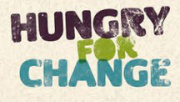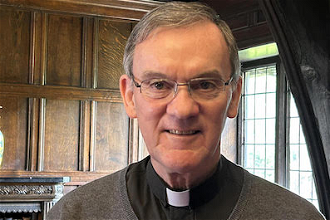CAFOD launches new food campaign

On Saturday, CAFOD brought together 250 campaigners from all over England and Wales to launch a new campaign that aims to improve the food system. During the campaigner conference, supporters heard from Bishop John Arnold, CAFOD partner Father Joe Komakoma and theologian David McLoughlin, before joining workshops looking at different aspects of the Hungry for Change campaign and how we can work together to bring about change.
From Westminster Cathedral Hall, CAFOD’s head of campaigns Clare Lyons told the enthusiastic crowd: “We are delighted to see so many people with such a wealth of enthusiasm and experience. We’ve all learnt so much from each other. Now the real work starts, getting the message out that it’s a scandal that millions of people go hungry in a world which provides enough food for all. Through campaigning, we can all do something about this.”
The Hungry for Change campaign is calling for fundamental changes in the global food system so that power is more justly shared between rich and poor people, and more people can have access to enough food. There are an estimated 870 million people worldwide without enough food to be healthy and live an active life. The overwhelming majority of these live in developing countries. Hunger is the world’s No1 health risk, killing more people every year than AIDS, malaria and tuberculosis combined. The recent financial crisis has pushed even more people around the world to the brink of starvation.
At the launch, Father Joe Komakoma shared stories from his native Zambia showing how, despite the country’s relative economic success, many small-scale farmers are struggling to survive and climate change is making it harder for families to grow enough food to eat and sell.
He said: “I hope that this campaign can raise awareness that there is a problem with food. People may not be aware that every night one in eight people goes without food. The more aware we are, the more obliged we are to do something about it. I hope people will lend their help to the Hungry for Change campaign and stand in solidarity with those who don’t have enough food.”
The new campaign highlights the fact that a handful of supermarkets and food companies dominate the food system, making the rules that decide cost, price and standards. They often also control access to vital resources such as land, seeds and water. Yet 50% of the world’s food is grown by small-scale farmers in developing countries. With little power in the global food supply chain, these farmers are often forced to agree to big companies’ demands regardless of how unfair.
CAFOD supporter Christine Smith, from Lancaster diocese, summed up the mood of the day for many campaigners: “I had a brilliant time at the Hungry for Change launch. It was great meeting other supporters to share our campaigning stories. It was so inspiring to hear what others have done and I came away with loads of ideas to get people I know involved in the campaign.”
CAFOD’s Hungry for Change campaign is asking for:
· The UK government to ensure ‘empowering aid’ - that helps small-farmers, especially women, speak up for their own needs and supports initiatives such as farming co-operatives - is a global priority;
· The UK government to include global food companies in the new statutory register of lobbyists so that we can all see how companies seek to influence government policy behind closed doors;
· For us all to look again at the choices we make about what we eat and buy. We are all part of the global food system and by choosing local, sustainable or Fairtrade food, reducing the food we waste, and eating less meat, we can all make a difference.
Background:
Hunger exists in different levels in every corner of the globe, but it is most extreme and concentrated in developing countries. In the last quarter of the 20th century people seemed to be winning the fight against hunger with the total number of hungry people going down. But just a few years into this century numbers were on the increase. Progress in reducing hunger has now levelled off and in some regions, especially Africa, hunger is increasing.
In 2008 the price of food rose sharply, and this was followed by a global financial crisis. These two events meant that by 2009 the number of hungry people had risen to more than one billion, dipping down to 925m the following year as food prices decreased. This is a far cry from the MDG target of halving hunger levels by 2015.
So, right now one in eight people in the world is hungry, and women and girls are affected disproportionately. What causes hunger is complex – a brutal mix of elements including natural disasters, conflict, poor agricultural infrastructure, the increasing impacts of climate change, the present economic crisis – but underpinning them all is poverty and imbalance of power.
Having nothing to fall back on means the poorest people are more vulnerable to sudden disasters, food price increases and ongoing climate change, tipping them into hunger and to the brink of starvation. Offering emergency aid to people in dire need is a vital stop-gap, but at any given moment there is enough food produced in the world to feed everyone. So if we want to end global hunger we have to address the way the food system works.
The food system is not only about food, it is about politics, economic, social justice and the environment. Food can be bought, sold and eaten all within a few miles of where it’s grown, or it can travel thousands of miles and pass through many different processes. But whether it is local or global, what matters most in the food system is who has the most power, because they are the people who make the rules, while the less powerful have to follow them.
While East Africa is still facing its worst drought in 60 years with 10million people in the region at risk of starvation, and as we all face the threat of a global food crisis, world leaders need to prioritise an overhaul of the food system that prioritises people rather than profit.
The Hungry for Change campaign runs for one year. Launching on November 10 it will run for 12 months, using campaigning and political moments, such as the UK’s hosting of the G8 in May 2013 to highlight the issues at stake and call for further support.
Take action: Sign a Hungry for Change action card or email Prime Minister David Cameron calling him to put the power in the food chain back in the hands of the poorest men and women. The final day for returning campaign action cards to CAFOD will be 1 October 2013. Take the online action: www.cafod.org.uk/Campaign/Take-action-today/Hungry-for-change
Watch CAFOD’s Hungry for Change short film: www.cafod.org.uk/Campaign/Get-clued-up/Food





















